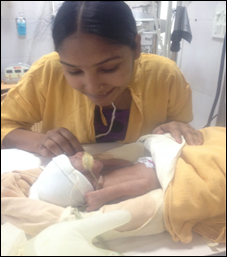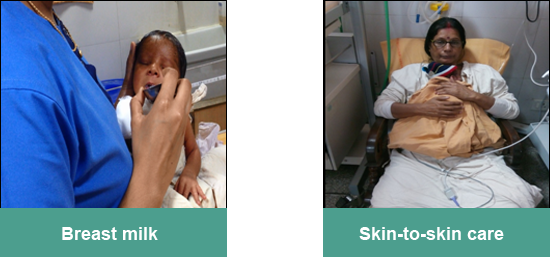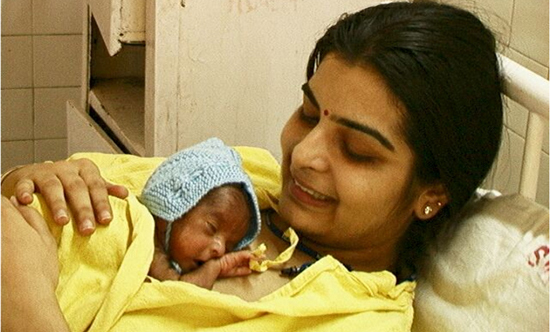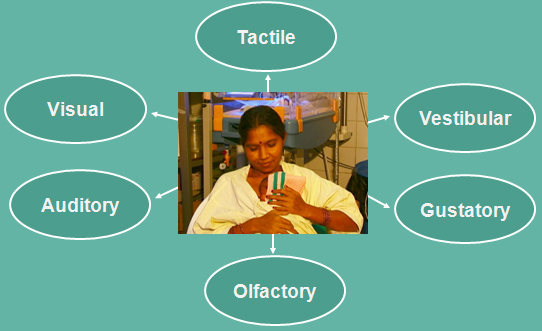Developmentally supportive care
- Introduction...
- 1. Learning object...
- 2. Brain growth - ...
- 3. Brain-experienc...
- 4. Neonatal sensor...
- 5. Challenge...
- 6. Developmentally...
- 7. Tactile...
- 8. Tactile – swa...
- 9. Tactile - mass...
- 10. Does the newbo...
- 11. Protection fro...
- 12. Smell and tast...
- 13. Non nutritive ...
- 14. Auditory...
- 15. Protection fro...
- 16. Vision...
- 17. Protection of ...
- 18. Kangaroo Mothe...
- 19. KMC-best devel...
- 20. 5 Core compone...
- 21. Developmentall...
- 22. Key messages...
 |
 |
Introduction
DR. SUMAN RAO
MD, DM (Neonatology)
Professor & Head
Department of Neonatology
St. John's Medical College Hospital
Sarjapur Road, Koramangala, Bangalore
1. Learning objectives
► What is developmentally supportive care?
► Why we need for developmentally supportive care?
► What are the components of developmentally supportive care?
► What are the methods of developmentally supportive care?
2. Brain growth - Ex utero


3. Brain-experience expectant experience dependent

4. Neonatal sensory systems
► Tactile (touch) -> vestibular (posture & balance) ->
gustatory (taste) -> olfactory (smell) -> auditory (hearing) ->
visual (sight)
► Stimulation of early maturing senses has positive influence
on late maturing senses
► Untimely stimulation within this sequence disrupts normal
maturation
5. Challenge
► High technology neonatal care
► Positive sensitive individualized approach
► Optimal neurobehavioral development
6. Developmentally supportive care
► Providing a structured care environment which supports,
encourages and guides the developmental organization of
the premature/ critically ill infant

7. Tactile


8. Tactile – swaddling, facilitated tuck

► Reduce pain
► Promote development
9. Tactile - massage

► Promotes neurobehavior, weight gain and sleep
► Decreases pain, stress and hospital stay
10. Does the newborn experience pain?

► A newborn including a preterm feels, responds to and
remembers pain
11. Protection from pain
► Newborns do experience pain
► They express pain with various behavioural and physiological
indicators
► Prevention/ minimization of pain is possible
► Prevention of pain is more important than treatment of pain
12. Smell and taste
► >32 wks
► Discriminate, remember, habituate

13. Non nutritive sucking

► Length of hospital stay
► Better feeding
14. Auditory
► Noise is harmful

♦ Stress
♦ Reduces sleep
♦ Hearing loss , Intraventricular hemmorhage, Periventricular
leucomalacia
♦ Lower intelligence
15. Protection from noise
► Music therapy
♦ Pacification
♦ Improves vital signs
♦ Feeding
♦ Sleep
► Mother singing in a soft voice
16. Vision

► Intense light - Interference with endogenous brain
cell activity
► Sleep deprivation
► Healing environment
► Avoid direct and intense light
► Use point source for procedures
► Adjustable light
17. Protection of sleep

► The activity occurring during REM sleep (or active sleep)
seems to be particularly important to the developing organism
► Deprivation of sleep -> neuronal cell death in brain mass

18. Kangaroo Mother Care


19. KMC-best developmentally supportive care !!!

20. 5 Core components of DSC

21. Developmentally supportive care
► DSC is a continuous process and not an end
► It starts with the birth of the infant
► The infants are unique and display wide variety of
behavior
► DSC has to be individualized for the infant
22. Key messages
► DSC – reduces stress and promotes growth
► Sequential stimulation of the senses
► KMC is the best form of DSC
► 5 core components of DSC
► It has to be individualized based on infant's cues
